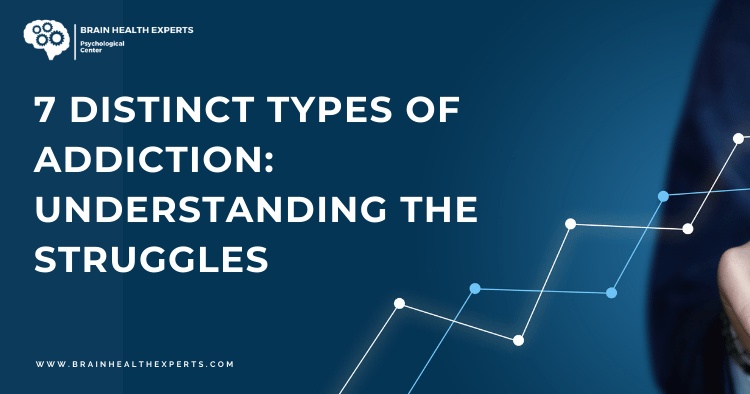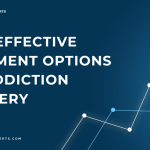Table of Contents
- Introduction
- Substance Addiction
- Behavioral Addiction
- Food Addiction
- Internet Addiction
- Gambling Addiction
- Work Addiction
- Relationship Addiction
- Conclusion
- FAQs
Introduction
Addiction is a complex, multifaceted issue that affects millions of people worldwide. While many people think of addiction primarily in terms of substances like alcohol or drugs, the reality is much broader. Various types of addiction can impact our lives in different ways. Understanding these distinct types can help us empathize with those struggling and foster a supportive environment for recovery. Let’s dive into the seven distinct types of addiction.
Substance Addiction
Substance addiction refers to the dependence on drugs or alcohol, significantly altering an individual’s physical and mental state. Common substances include:
| Type of Substance | Description |
|---|---|
| Alcohol | A legal substance that can lead to severe health issues and dependency. |
| Opioids | Prescription medications or illegal drugs like heroin that are highly addictive. |
| Stimulants | Substances like cocaine or meth that increase alertness but can lead to severe dependence. |
| Nicotine | Found in tobacco products; highly addictive and linked to numerous health risks. |
People grappling with substance addiction may experience withdrawal symptoms, cravings, and changes in behavior. Resources like the Substance Abuse and Mental Health Services Administration (SAMHSA) provide tools and support for those seeking help.
Behavioral Addiction
Behavioral addiction involves compulsive engagement in activities that lead to negative consequences. Unlike substance addiction, the addictive behaviors themselves can be the source of the problem. Some common examples include:
- Shopping Addiction: Compulsive spending can lead to financial distress and relationship issues.
- Gaming Addiction: Excessive gaming can interfere with daily responsibilities and social interactions.
- Compulsive Cleaning: While cleanliness is vital, an obsession can signal deeper emotional issues.
Recognizing behavioral addiction is vital for finding appropriate treatment avenues. Support groups and therapy are often effective methods for managing these compulsions. Additionally, techniques to cultivate a positive mindset can significantly help in overcoming these challenges; you can explore more about this in our article on 10 Powerful Techniques to Cultivate a Positive Mindset.
Food Addiction
Food addiction is characterized by an uncontrollable urge to eat, often leading to binge eating and other related issues. This type of addiction can manifest as a way to cope with emotional distress, stress, or anxiety.
Signs of Food Addiction:
- Eating in secret
- Eating until uncomfortably full
- Obsessing over food and dieting
For those struggling with food addiction, consulting with a dietitian or a therapist specializing in eating disorders can be beneficial. The National Eating Disorders Association (NEDA) offers resources and support.
Internet Addiction
With the rise of technology, internet addiction has emerged as a significant concern. This type of addiction manifests in excessive use of the internet, often at the expense of real-life relationships and responsibilities. Key aspects include:
- Social Media Addiction: Compulsively checking social media platforms can lead to anxiety and depression.
- Online Gaming: Similar to gaming addiction, it involves neglecting daily responsibilities for online play.
Recognizing the signs of internet addiction can help individuals take steps to regain control. Limiting screen time and seeking counseling are effective strategies for recovery. Positive thinking techniques can also be beneficial; consider reading our piece on 10 Positive Thinking Techniques to Reduce Stress for insights.
Gambling Addiction
Gambling addiction, also known as compulsive gambling, is a progressive disorder characterized by an uncontrollable urge to gamble despite negative consequences. It can lead to severe financial problems, strained relationships, and emotional distress.
Signs of Gambling Addiction:
- Lying about gambling habits
- Increasing bets to achieve the same thrill
- Borrowing money to gamble or pay off debts
Support groups like Gamblers Anonymous provide a community and structured approach to recovery. Visit Gamblers Anonymous for more information.
Work Addiction
Also known as workaholism, work addiction is the compulsive need to work excessively, often to the detriment of personal relationships and health. Signs include:
- Inability to disconnect from work
- Neglecting self-care and personal interests
- Feeling guilt when not working
Addressing work addiction often involves setting boundaries, practicing mindfulness, and seeking help from a mental health professional. Resources such as the American Psychological Association (APA) can provide guidance. You might also find value in our article on 10 Effective Stress Management Strategies for Workplace to help mitigate work-related stress.
Relationship Addiction
Relationship addiction, or love addiction, involves an unhealthy dependence on romantic relationships. Individuals may find themselves engaging in destructive patterns, such as:
- Staying in toxic relationships due to fear of abandonment
- Obsessively pursuing romantic interests
- Neglecting personal well-being for the sake of the relationship
Therapy can be vital for those looking to break free from these unhealthy cycles. Support groups can also provide a sense of community and understanding, paralleling the benefits of fostering positive thinking found in our article 10 Ways Positive Thinking Transforms Your Relationships.
Conclusion
Understanding the various types of addiction is the first step towards empathy and support for those affected. Each type presents unique challenges, but with the right resources and help, individuals can find their way to recovery. If you or someone you know is struggling with addiction, don’t hesitate to reach out for help.
FAQs
Q1: What are the common signs of addiction?
A1: Common signs include withdrawal symptoms, cravings, neglecting responsibilities, and changes in behavior.
Q2: How can I support someone struggling with addiction?
A2: Encourage them to seek professional help, offer your support, and avoid enabling their behaviors.
Q3: Where can I find help for addiction?
A3: You can find resources through organizations like SAMHSA, NEDA, and Gamblers Anonymous, or consult a healthcare professional.
Q4: Can addiction be treated?
A4: Yes, addiction is treatable. Various therapies, support groups, and rehabilitation programs can aid in recovery.
By educating ourselves on the distinct types of addiction, we can foster a more supportive community and help those in need find their path to recovery. Furthermore, incorporating positive thinking and emotional intelligence strategies into recovery can significantly enhance the healing process. For more insights on these topics, explore our collection of articles on emotional intelligence and positive thinking.





